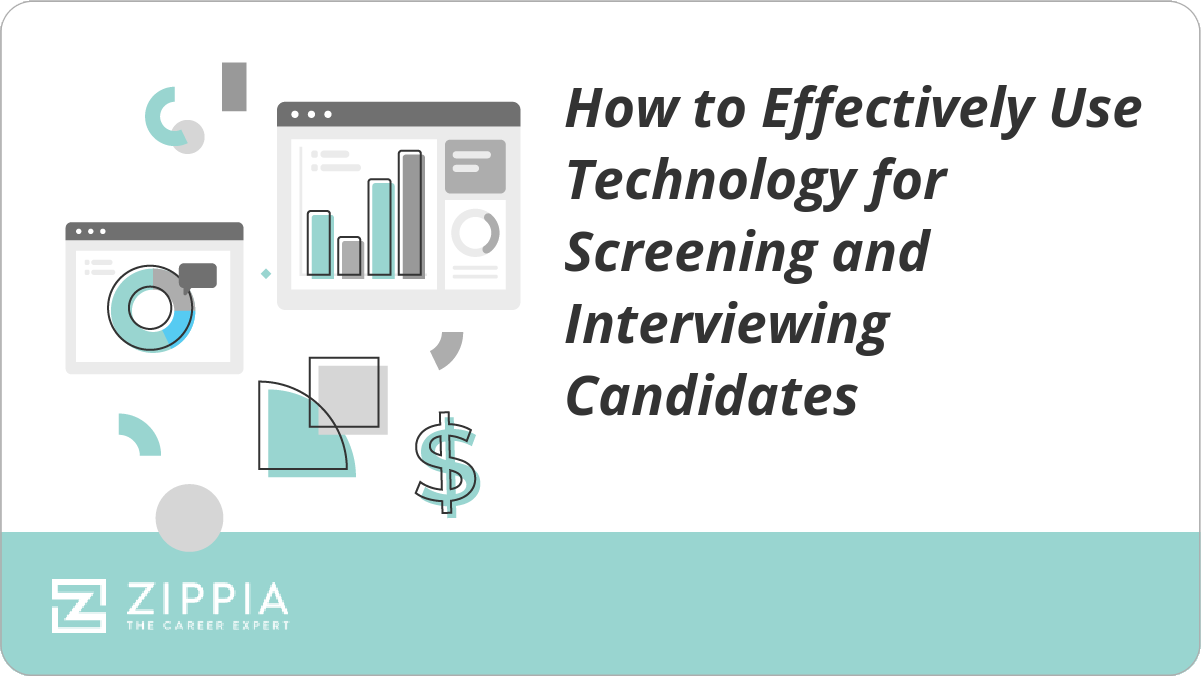Recruitment has always been a combination of art and science. It is a challenging function and critical to the success of companies. Staff turnover rates are increasing, people are more selective about where they work but vacancies generate an overwhelming amount of applications. This makes it even more challenging.
Fortunately, technology is evolving at a rapid pace and there are a number of powerful tools that recruiters can use to streamline and speed up the process. Getting it wrong is expensive, especially with professionals, and technology can help reduce errors.
The main game changer has been the evolution of artificial intelligence (AI) but this is just one of the technologies. It is important to match the correct technology with the needs of your organization in order to get the maximum benefit.
Key Takeaways:
-
Using technology in your interview process can help save time, reduce the risks of poor hires, and it helps lower costs.
-
Some types of technology that can be use include:
-
Video
-
Applicant Tracking Systems
-
Chatbots
-
Social media
-
-
One issue of switching to technology for screening candidates is a significant amount of data is needed for the process.

Advantages and Disadvantages of using technology
There are many advantages and disadvantages from incorporating technology into your recruitment process. They include:
Advantages:
-
Saves time. Screening, interviewing and decision making are time-consuming. With increased applicants and, in many cases, higher staff turnover, this is becoming a growing problem and putting a strain on the limited resources of HR departments.
Like any other business unit in a competitive environment, HR needs to be productive and work within tight budgets. Technology can help them achieve this. It has the potential to speed up the process from start to finish.
Technology can automate and eliminate repetitive tasks, simply processes, streamline and manage workflows and track progress. Video is just one example of where technology can save a huge amount of time.
-
Reduces risk. There is always an element of risk and poor hires, and even wasted interviews cost money. Technology can improve the process and make it more accurate and reduce errors.
-
Lower costs. Video or online interviews and faster processes with fewer errors will reduce the cost associated with recruiting.
-
Function more strategically. Technology can help HR to plan and manage more strategically and improve decision making. Using the data and valuable insights generated in the department can lead to more effective and efficient recruitment.
-
Improved quality and standardization. Using technology in the screening and recruitment process and analyzing the data that is available will enable HR to create greater standardization throughout the organization and across geographical boundaries. This will also increase accuracy and quality of hires.
Disadvantages:
-
Reluctance to use technology. HR has always been about human relationships and many people in the field are not as accepting of new technology as most other areas of the business. Compounding the problem is the sudden influx of a range of new technologies and many HR practitioners are feeling a bit overwhelmed and reluctant to adopt new solutions.
-
A significant amount of data is needed. For the more advanced solutions, particularly artificial intelligence (AI), a large amount of data is needed before it can provide insights and assistance. This will take a while to build up.
-
Human biases can be adopted by technology. The technology will often learn from those operating it which means it can pick up bad human habits such as bias. It is important to be aware of these potential pitfalls before adopting or relying on any new technology so that the challenges can be mitigated.
Types of Technology Available
There are many technologies that can assist with the screening and interview process with new ones constantly evolving. Here are some of the more important options:
-
Video
Video, digital or online interviewing is a major benefit and cost saver for many companies. Particularly for professional positions, potential applicants often come from outside of the immediate area. A video interview will save time and money as you can shortlist on video and only fly in the really strong candidates for a face to face interview.
There is also technology that allows you to record and share the interview video. The technology can even go a step further with software that, with the help of AI, can analyze and interpret facial expressions, speech and word usage.
-
Gamification
This popular developing technology has numerous applications but has proved to be especially useful in screening applicants. The aim is to create a virtual game-like situation where you can observe and measure various aspects of the candidate’s personality and skills. This can include their problem-solving ability, decision-making skills and competitiveness.
It puts the participants in a fun, relaxed environment which will appeal to most of them. Their behavior will be more natural and real than they would portray themselves in a traditional interview.
-
Online Personality and Psychometric Tests
Although the tests are nothing new, using technology to make them accessible online can save time and money. If the candidate does not fit your required profile they can be eliminated early on without any further expense.
-
Skills Testing
While recruiters have used skills testing for many years, the process has become more complex. Often, the candidates they are looking for work in fields that HR have little knowledge of, or experience in. This challenge has spawned a range of sophisticated and highly specialized skill testing applications. These are especially important for IT staff.
As qualifications become less relevant and practical skills more important, these skills tests will increase in value to recruiters. Relevant skills tests will also improve accuracy in hiring.
-
Applicant Tracking Systems
The ATS is quite widely used and when used correctly, can be a major help. The important consideration is to know how to use it and apply it correctly. Recruiters should not rely on an ATS entirely but use it as a tool to assist them.
-
Intelligent Screening Software
Using the power of AI, software is available that can use existing data to draw valuable and practical insights that will allow recruiters to fine-tune the screening and recruiting process. It can learn from the wins and losses you have had with staff in the past. It can also help speed up the screening process by verifying facts on resumes.
-
Chatbots
The use of chatbots by recruiters is still in the fairly early stages of development but they can help to speed up communication during the recruitment process, track progress and streamline the process.
-
Social Media
Although recruiters have been using social media for many years, technology can make it more powerful and accurate. It is important to understand the platforms and the potential that can be gained from them. It should be an integral part of the recruitment process.
-
Job Boards
Career pages and job boards are still relevant and should be used in conjunction with social media and other recruitment efforts.
-
Recruiting on Mobile
It is important to note that most technology and communication is increasingly becoming mobile. As such, it is important that all your recruitment efforts are optimized for mobile. Failure to do this correctly we prevent you from reaching a large percentage of the talent pool.
Using Technology for Screening and Interviewing Candidates FAQ
-
Does using technology lead to effective recruitment and selection?
Yes, using technology can help make your recruitment process more effective. Using chatbots and an AI system can help scan applications for the necessary information and alert the candidate if the position is suitable for them.
-
How can technology improve your interview process?
Technology can help improve your interview process by avoiding any delays. This is important if you have a lot of applicants because it will help narrow down your potential candidates without having to go through all the resumes by hand.
-
What technology is used in recruiting?
Chatbots can be used to perform screenings and reach out to candidates when there are updates to their job status. Other helpful technology that can be used is an applicant tracking system to help sort out the applicants that have the qualifications.
-
How do you implement new technology in the workplace?
Before implementing any technology in the workplace, it’s important to plan and understand the change that is coming. Once the planning and the design is done, implementing the technology is the next step. After introducing it to your employees, make sure that you offer them support as they are trying to figure out the new technology.
Final Thoughts
Technology has impacted all areas of business to the benefit of those departments. It has a lot to offer HR departments particularly in the screening and interviewing of candidates. Nowhere is this more important than when hiring professionals. This is an important and expensive investment and it critical to get the right person or people in place.
More candidates need to be seen more often with limited resources. Technology has the power to speed the process up, save a substantial amount of money and improve accuracy. In order to stay relevant and effective, recruiters need to find the technologies that can assist them and help them with the process.
- Interviewer Tips
- Structured Interviews
- How To Be A Good Interviewer
- Interview Note-taking
- Memorable Candidate Interview Moments
- Top Companies With Unique Interviewing Strategies
- How To Be A Consistent Interviewer
- Topgrading Interview Process
- How To Use Technology To Screen Interviewing Candidates
- How To Make A Great Impression With Your Candidates
- How To Be An Expert Interviewer
- How To Build Rapport During An Interview
- The Do's And Dont's Of Personality Testing
- What To Pay Attention To When Conducting Interviews





